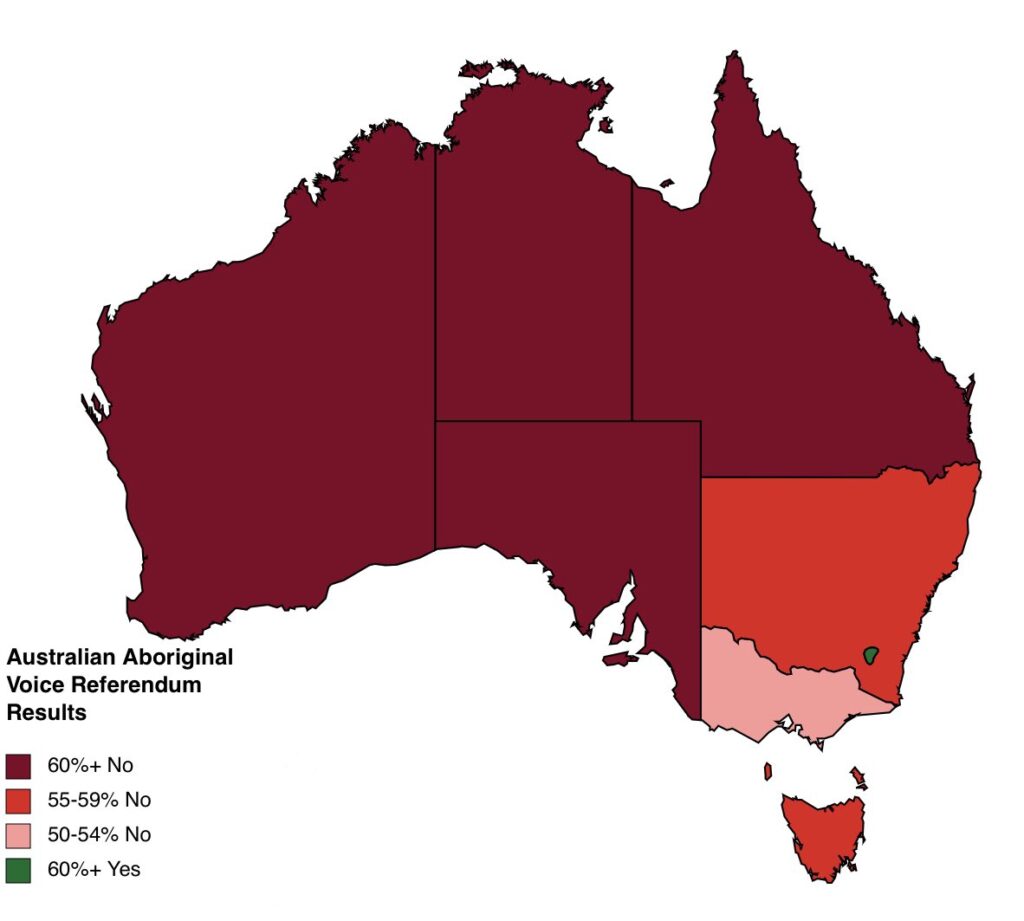Voice Referendum a failure worth AUD 450 million
Australia witnessed a significant setback in its journey towards reconciliation with Indigenous communities as a proposal to recognize them in the constitution was resoundingly rejected in a historic referendum. In the first national referendum in nearly 25 years, Australians were asked to cast their votes, either “Yes” or “No,” on the issue of amending the constitution to acknowledge Aboriginal and Torres Strait Islander people by creating an Indigenous advisory body known as the “Voice to Parliament“. Indeed Voice Referendum a failure worth AUD 450 million.
| State | Yes | Yes % | No | No % | Informal |
|---|---|---|---|---|---|
| NSW | 1,814,603 | 40.48 | 2,668,269 | 59.52 | 55,390 |
| VIC | 1,561,563 | 44.99 | 1,909,577 | 55.01 | 36,183 |
| QLD | 833,117 | 31.22 | 1,835,552 | 68.78 | 24,587 |
| SA | 352,737 | 35.40 | 643,649 | 64.60 | 10,767 |
| WA | 492,398 | 36.41 | 860,125 | 63.59 | 12,068 |
| TAS | 134,809 | 40.49 | 198,152 | 59.51 | 3,812 |
| NT | 37,713 | 39.39 | 58,034 | 60.61 | 782 |
| ACT | 158,097 | 60.78 | 102,002 | 39.22 | 2,238 |
| National | 5,385,037 | 39.42 | 8,275,360 | 60.58 | 145,827 |

Table of Contents
A Landslide “No” Vote
With approximately 70% of the vote counted, the “No” camp secured a commanding lead with 60% against the “Yes” vote’s 40%. Major Australian broadcasters and TV networks have projected that a majority of voters across all six states in Australia have rejected the proposed constitutional change. The latest counts can be found at the AEC Website.
A New Path for Reconciliation
Prime Minister Anthony Albanese, while expressing his disappointment, acknowledged the need to explore alternative avenues for advancing reconciliation with Indigenous communities. He emphasized that the nation’s path to reconciliation has often been challenging, and the referendum outcome should not mark the end of efforts to bring people together.
Concerns Over Setback in Reconciliation Efforts – The victory of the “No” camp has raised concerns among academics and human rights advocates who fear it could set back reconciliation efforts by several years.
The Uluru Statement from the Heart
The proposed Voice to Parliament was an integral component of The Uluru Statement from the Heart, a document crafted by Indigenous leaders in 2017 that outlined a roadmap for reconciliation with the wider Australian population. Indigenous citizens, constituting 3.8% of Australia’s population, have a history on the continent dating back 60,000 years. Despite their long-standing presence, the constitution does not mention them, and by most socio-economic measures, they remain the most disadvantaged group in the nation.
Supporters of the constitutional change believed that embedding an Indigenous Voice would foster unity and a new era for Indigenous communities. However, some Indigenous individuals viewed it as a distraction from achieving practical, positive outcomes.
Political opposition to the proposal contended that it would be divisive, ineffective, and hinder government decision-making processes.
A Challenging Referendum Landscape
Referendums in Australia are notoriously difficult to pass, with only eight out of 44 succeeding since the country’s federation in 1901. This marks the first referendum since the rejection of a proposal to become a republic almost 25 years ago.
The current referendum lacked unified support, with leaders of major conservative parties advocating for a “No” vote. Historically, no referendum in Australia has succeeded without bipartisan backing.
A Significant Setback for Prime Minister Albanese
The Voice to Parliament was a central component of Prime Minister Albanese’s leadership, and a defeat in the referendum represents a significant setback for his government. Political analysts note that this could be his most substantial setback since taking office in May the previous year.
Prime Minister Albanese criticized sections of the media for steering the referendum debate away from its core issues, contributing to public confusion.
As Australia grapples with the outcome of this landmark referendum, the future of reconciliation efforts with Indigenous communities remains uncertain.
Criticism and the Role of Misinformation
Opposition leader Peter Dutton criticized the referendum, suggesting it was unnecessary and divisive. Misinformation, particularly on social media, played a role in creating fear that the Voice could become a third chamber of parliament, leading to more disputes and increased federal aid for Aboriginal people.
Voice Referendum a failure worth AUD 450 million
After all this promotion and political outcast of so called Referendum exercise, conducted to provide the voice of original inhabitants of this nation, and indeed the expenditure of 450 million Australian Dollars of the tax payers money. The key question still remains unanswered –
- What action was taken to improve the living conditions of every day tax paying Australian?
- Is there any positive impact on cost of living crisis after this so called Referendum 2023?
- Does our political elite even know the cost of fuel per liter and how much is a family of 4 spending in groceries each week?
- Will the utility bills (gas, electricity, water, land tax, insurance costs) come down?
- Will the housing crisis situation improve?
- Will Australia still be described as The Lucky Country?
We hope our Prime Minister will now be able to focus on improving lives of common Australians, paying taxes to ensure the nation shouldn’t derail, even when their lives are already off track.



